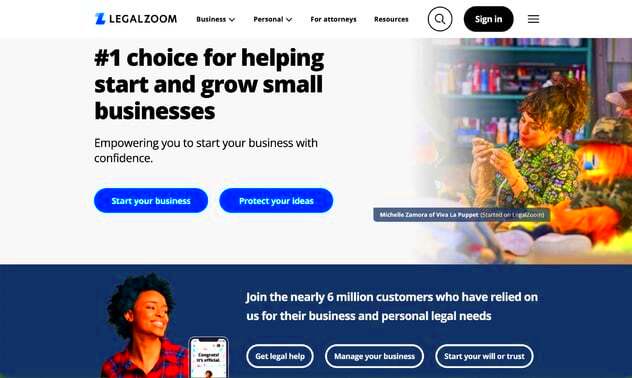Every small business today needs a strong online presence. Your website acts as your virtual storefront, serving as the first point of contact for potential customers. But with so many website providers out there, how do you choose the right one? In this post, we’ll explore some top website providers specifically tailored for small business owners, helping you make an informed decision that suits your needs and budget.
Why Choosing the Right Website Provider Matters

When it comes to building your online presence, selecting the right website provider can significantly impact your business success. Here’s why it’s crucial:
- First Impressions Count: Your website is often the first interaction potential customers have with your brand. A professional-looking site fosters trust and credibility.
- Ease of Use: Some website builders offer user-friendly interfaces that allow you to create and update your site without needing extensive technical knowledge. This can save you time and resources.
- Cost Efficiency: Choosing the right provider can fit your budget and still deliver quality features that enhance your online presence. Some offer free plans, while others might charge a premium for more advanced capabilities.
- Customer Support: Reliable customer support is vital. When issues arise (and they will), you’ll want a provider that’s there to help you resolve them quickly.
- Scalability: Your business may grow, and your website needs to grow with you. Select a provider that allows easy upgrades and additional features as you expand.
By weighing these factors, you’ll be better equipped to choose a website provider that meets your specific needs and helps you achieve your business goals.
Factors to Consider When Selecting a Website Provider

Choosing the right website provider for your small business is crucial, as it can significantly impact your online presence and overall success. Here are some vital factors you should consider when making your selection:
- Ease of Use: Look for a provider that offers a user-friendly interface. You want to spend your time running your business, not wrestling with complex tools. Check if they provide drag-and-drop features to simplify website building.
- Customizability: Every business is unique, so having the flexibility to customize templates, designs, and functionalities is essential. Ensure the provider allows you to create a site that reflects your brand and meets your needs.
- Customer Support: Reliable support is a must. Whether you prefer live chat, email, or phone support, make sure the provider offers assistance during hours that work for you, especially if you run a business with unconventional hours.
- Pricing: Compare pricing plans carefully. Be aware of hidden costs that might crop up down the line, such as transaction fees or charges for essential features. Opt for a plan that suits your budget while still providing the features you need.
- Scalability: As your business grows, so will your website needs. Choose a provider that allows for easy upgrades or modifications to accommodate increased traffic and additional features.
- SEO Features: A website is only useful if people can find it. Look for providers that have built-in SEO tools to help you improve your search engine rankings and attract more visitors.
Top Website Providers Overview

When it comes to selecting a website provider, several platforms stand out in the crowded marketplace. Here’s a quick overview of some of the top contenders for small business owners:
| Provider | Best For | Key Features | Starting Price |
|---|---|---|---|
| Wix | Ease of Use | Drag-and-drop builder, App Market, 500+ templates | $14/month |
| Squarespace | Design-Focused Businesses | Stunning templates, eCommerce capabilities, SEO tools | $16/month |
| Shopify | Online Stores | Robust eCommerce features, Payment gateways, App integrations | $29/month |
| WordPress.com | Customizable Websites | Plugin flexibility, SEO-friendly, Multi-user capabilities | $4/month |
| Weebly | Small Business Owners | Built-in eCommerce, SEO options, Mobile responsiveness | $6/month |
Choosing the right website provider will depend on your specific business needs, budget, and long-term goals. Evaluate these options carefully, and you’ll be well on your way to establishing a successful online presence.
1. Wix
Wix is often touted as one of the leading website builders, especially for small business owners. It offers an intuitive drag-and-drop interface that makes it incredibly easy for anyone to create a professional-looking website without needing any coding skills. This means that you can focus on what you do best—running your business—without getting bogged down in website design.
One of the standout features of Wix is the sheer variety of customizable templates it offers. Whether you’re in retail, hospitality, or freelance services, there’s a template tailored to your industry. Plus, Wix frequently updates its library, so you can stay trendy with your site’s design.
Wix also provides a range of features that are vital for small businesses, such as:
- SEO Tools: Built-in SEO tools ensure that your business gets found in search engine results.
- Mobile Optimization: Your website will be automatically optimized for mobile users, which is crucial in today’s mobile-first world.
- E-commerce Capabilities: You can easily set up an online store with various payment options.
- Support: Wix offers customer support and a knowledge base to assist you through any challenges.
However, it’s worth noting that while Wix has a free plan, you’ll encounter limitations such as Wix branding on your site. For a more professional appearance, you might want to consider the premium plans. Overall, Wix is a fantastic choice for small business owners looking to create a stunning online presence quickly and efficiently.
2. Squarespace
Squarespace has carved out a niche for itself among creatives and small business owners alike, thanks to its beautiful, minimalist design templates. If you’re looking for a platform that allows you to showcase stunning images and build a visually appealing website, Squarespace might just be the right fit for you.
One of the most admirable aspects of Squarespace is its all-in-one platform. Here’s what you can expect:
- User-Friendly Drag-and-Drop Interface: Even if you have zero technical expertise, you can build a gorgeous website.
- Integrated E-commerce Options: You can sell products or services directly from your site seamlessly.
- 24/7 Customer Support: Access to support via email and live chat ensures help is available whenever you need it.
- Analytics Tools: Gain insights into your audience’s behavior, which can be invaluable for marketing strategies.
What really sets Squarespace apart, though, is its commitment to design elegance. All templates are fully responsive, meaning they look great on both desktop and mobile devices. Moreover, Squarespace provides excellent blogging tools, beneficial for small business owners wishing to share their expertise and engage their audience.
However, Squarespace does not offer a free plan, so you’ll need to opt for one of its subscription plans. Still, many small business owners find the investment worthwhile because of the high-level design quality available, along with the myriad of features tailored for growth. If brand aesthetics are a priority for your business, Squarespace is undoubtedly worth considering.
3. WordPress.org
If you’re a small business owner looking to establish a robust online presence, WordPress.org should definitely be on your radar. It’s an open-source content management system that powers over 40% of all websites on the internet. With its extensive range of tools and customizable options, WordPress.org stands out as a top choice for businesses of all sizes.
One of the biggest advantages of using WordPress.org is its flexibility. Whether you’re running a simple blog or a fully-fledged e-commerce store, you can tailor your site to meet your specific needs. Here are some of the standout features:
- Customizable Themes: Choose from thousands of free and premium themes that dictate the look and feel of your website.
- Plugins Galore: Extend your site’s functionality with plugins for SEO, social sharing, e-commerce, and much more.
- SEO Friendly: WordPress is designed to be search engine friendly, and you can enhance this with plugins like Yoast SEO.
- Responsive Design: Most themes are mobile-responsive, ensuring your site looks great on any device.
However, it’s worth noting that WordPress.org requires you to find your own hosting provider, which can be an extra step. Still, the control you gain over your website’s design and functionality far outweighs that minor obstacle. Overall, if you want flexibility and scalability, WordPress.org is a fantastic choice for any small business owner aiming to make their mark online.
4. Shopify
If you’re thinking about diving into the world of e-commerce, Shopify might just be the secret sauce you need to make your business thrive. Designed specifically for online selling, Shopify is a user-friendly platform that empowers small business owners to set up and manage their online store effortlessly.
One of the best things about Shopify is its simplicity. You don’t need to be tech-savvy to get started. Here’s what makes Shopify a top contender for small business owners:
- Ease of Use: Shopify offers a very intuitive interface, making it easy for anyone to create their online store without any coding skills.
- Customizable Themes: You have access to a plethora of professional themes that you can customize to match your brand’s vibe.
- Integrated Payment Processing: Shopify supports various payment methods, including credit cards, PayPal, and more, making transactions a breeze for your customers.
- Mobile Optimization: Your store will work seamlessly on mobile devices, which is critical considering how many people shop on their phones these days.
That said, Shopify does come with monthly fees, and some of the transaction fees can add up, especially if you’re using external payment gateways. However, the ease of use and comprehensive e-commerce tools make it a worthwhile investment for small business owners who are serious about online sales. With Shopify, you can focus on growing your business rather than getting lost in the technical details.
5. Weebly
Weebly is a fantastic website builder that’s perfect for small business owners looking to establish an online presence without getting bogged down by technical complexities. Its intuitive drag-and-drop interface allows users to create beautiful websites with ease, making it suitable for everyone, regardless of their tech skills. Plus, it offers a variety of customizable themes, so you can ensure your site reflects your brand’s personality.
One of Weebly’s standout features is its e-commerce capabilities. If you’re aiming to sell products online, Weebly provides a straightforward platform where you can set up an online shop, manage inventory, and even track orders. The integration with payment gateways like PayPal and Square simplifies the process, enabling you to start selling in no time.
- User-Friendly Interface: Ideal for beginners, no coding necessary!
- E-Commerce Features: Sell products directly from your website.
- SEO Tools: Built-in SEO options to help improve your site’s visibility.
- Mobile Optimization: Your site will look great on any device.
Weebly also offers a solid support system through a comprehensive help center and community forum, ensuring that you have access to help whenever you need it. Whether you’re launching a new product or building a portfolio to showcase your work, Weebly is a reliable partner on your business journey.
6. GoDaddy
GoDaddy isn’t just your typical domain registrar; it’s a powerhouse when it comes to website building for small businesses. With its streamlined website builder, even the most non-tech-savvy individual can whip up a fully functional site in minutes. GoDaddy’s templates are modern and responsive, ensuring that your website will look great on desktops, tablets, and smartphones alike.
One of the unique selling points of GoDaddy is its comprehensive suite of services. Beyond just website building, it offers domain registration, email hosting, SEO tools, and marketing services all in one place. This integrated approach lets you manage every aspect of your online business without having to juggle multiple providers.
| Feature | Description |
|---|---|
| Website Builder | Easy drag-and-drop functionality for quick site creation. |
| E-Commerce Options | Sell products and services with built-in shopping cart features. |
| 24/7 Customer Support | Assistance at any time, regardless of your location. |
| SEO Tools | Optimize your site to rank higher in search engines. |
Additionally, GoDaddy provides various marketing tools to promote your business effectively. From email marketing to social media integration, you can easily reach your audience. With its robust security features and simple user interface, GoDaddy stands out as a strong contender for small business owners aiming to build a comprehensive online presence.
Comparison of Features and Pricing
When it comes to selecting a website provider for your small business, the features and pricing are undoubtedly two of the most critical factors to consider. With an array of platforms available, it can be overwhelming to decide which one fits your needs best. In this section, we’ll break down some of the key features offered by popular website providers and compare their pricing structures.
1. Website Builders
- Wix: Known for its drag-and-drop interface, Wix offers customizable templates, an app market, and SEO tools. Pricing starts at around $14 per month for the basic plan.
- Squarespace: This provider is highly aesthetic, encouraging stunning designs with built-in analytics. Their plans start at about $12 per month.
- Weebly: Focused on simplicity, Weebly is great for beginners. Its features include eCommerce capabilities with plans starting at $6 per month.
2. Content Management Systems (CMS)
- WordPress.org: A flexible choice with numerous plugins and themes, WordPress is ideal for customization. Hosting costs can vary but average $7-15 per month, not including additional costs for premium themes and plugins.
- Shopify: Perfect for eCommerce, Shopify provides various sales tools, payment gateways, and inventory management. Pricing begins at $29 per month.
Beyond the basic features, consider customer support, mobile optimization, and security features when making your decision. Ultimately, the right choice will depend on your specific business needs and budget.
Testimonials from Small Business Owners
Nothing speaks louder than the voices of those who have been there, done that. When choosing a website provider, understanding the experiences of other small business owners can be invaluable. Here, we collect some heartfelt testimonials that illustrate the impact of these services on real businesses.
| Business Owner | Provider | Testimonial |
|---|---|---|
| Lisa D., Boutique Owner | Squarespace | “Squarespace has transformed my online presence! The beautiful templates allowed me to showcase my products elegantly, and I’ve seen a noticeable increase in foot traffic.” |
| James K., Consultant | Wix | “As someone with little tech experience, Wix made building my site a breeze. Their customer support was incredibly helpful in guiding me through the process.” |
| Maria R., eCommerce Entrepreneur | Shopify | “Shopify has been a game changer for my business. The ease of setting up an online store was amazing, and the payment processing is seamless!” |
Takeaway: These testimonials not only showcase positive outcomes but also highlight how different providers can meet various business needs. Before you make your decision, consider reaching out to fellow entrepreneurs in your network or browsing reviews online. Genuine feedback can give you insights that marketing materials simply can’t!
Conclusion
In summary, selecting the right website provider is a crucial step for small business owners aiming to establish a robust online presence. With various options in the market, it’s essential to consider features, affordability, and user-friendliness when deciding.
Here are the top website providers that cater specifically to small business needs:
| Provider | Key Features | Pricing |
|---|---|---|
| Wix |
|
Starts at $14/month |
| Squarespace |
|
Starting from $12/month |
| Shopify |
|
Plans start at $29/month |
| WordPress.com |
|
Free basic plan, premium starts at $4/month |
| GoDaddy |
|
Starts at $6.99/month |
Each provider has its unique strengths and weaknesses, so take your time to evaluate which aligns best with your specific business needs. Investing in a quality website provider can significantly impact your brand’s growth and visibility.



